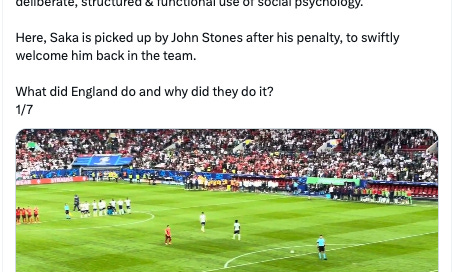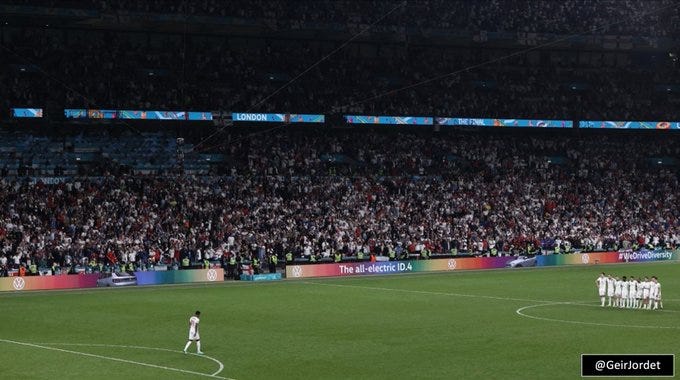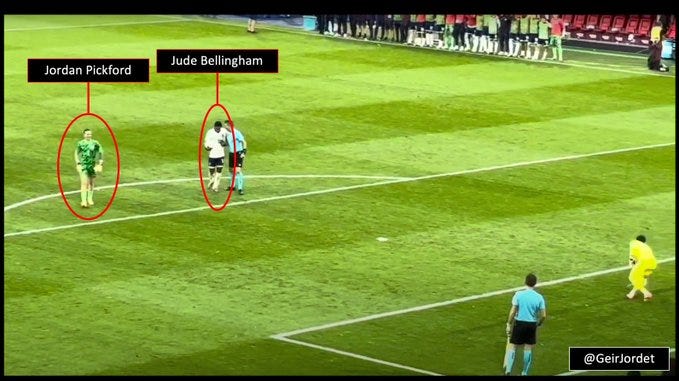The psychological safety of penalty shootouts
ALSO: Four-Day Week trial declared a 'win-win-win'
Learning lessons about work from the wider world can be a helpful way to bring jargony concepts to life.
Discussions about psychological safety can feel simultaneously important and a little abstract.
While the European championships are still in play this wonderful Twitter thread gives an compelling insight into a practical application of psychological safety in a high pressure environment.
We might tell our teams that failure is ok, but how do we truly make them assured that fear of failure doesn’t estrange them from the group?
Geir Jordet, a researcher who specialises in penalty shootouts, is at the leading edge of understanding how to apply an understanding of the human mind to creating better results. Jordet has studied over 700 penalty shootouts over the last 3 decades to understand what circumstances leads to greater success.
The old adage about penalty shootouts used to be that they were a lottery. Jordet is amongst the leading voices who have challenged that lazy belief, his book Pressure: Lessons from the psychology of the penalty shoot out goes a long way to disabuse that assumption.
He believes that success in shootouts is about preparation, detail and creating the right culture for success - something that we’re still learning about.
England manager Gareth Southgate was credited, back at the 2018 World Cup, with burying the country’s hoodoo with penalty shootouts by practicing and taking the challenge seriously, in doing this he clearly drew from his own experience of failing at the same endeavour himself. But his most potent lessons in 2024 seem to be drawn, not from the successes of 2018 or from his own failings in 1996, but of the unsuccessful shootout of Euro 2020 (which took place in 2021) and the toll it took on his players.
After England beat Switzerland in Saturday’s Quarter Final Geir Jordet took to Twitter to explain how the team are still adding small touches to get these critical moments right.
Watching along on the night you might have seen that Bukayo Saka was met (after successfully taking his penalty) by John Stones. This wasn’t an accident. In the new routine each penalty taker has a buddy assigned to them.
The buddy is a protective support role, a non-penalty taker assigned to each individual who steps up to take a kick.
In the case of England on Saturday night all of the penalties were successful, but the buddy would go and meet the player whatever the outcome. This prevents the situation in 2021 when Marcus Rashford walked 50 metres alone after missing his kick. There he was greeted by team mates with arms interlocked. With a social psychology lens this could have subconsciously communicated ‘us’ vs ‘you’, each of the players with locked arms unsure whether to break the chain or console their colleague.
As Geir Jordet points out England now deliberately choose not to lock arms in the centre circle, this gives them the freedom to provide support (rather than merely looking united).
The attention to detail is fascinating to observe beyond simple psychological safety.
The England routine for the last two penalty shootouts has included the detail that the ball is handed to the English penalty taker by England keeper Jordan Pickford. He delivers the ball while staring down the opposing keeper - briefly creating a sense of 2 against 1. Against Switzerland last weekend the referee saw this tactic and banned it from happening by the end of the shootout.
Jordet has written extensively about this - and you can watch a full interview between him and sport scientist Dr Steve Ingham here:
Britain’s biggest trial of the 4-day week saw lower resignation rates, faster planning decisions and better customer response times. The trial which Tory ministers (remember them?) had responded to with an order to ‘end your experiment immediately’ has been declared a ‘win-win-win’ by the bosses of Cambridge city council
According to KPMG one in 4 firms are weighing up the idea of going to a 4-day week
Meanwhile in Greece the government made a six-day week a legal requirement if demanded by employers
Gen Z workers have different expectations and approaches than older colleagues. In the past workers might have asked a colleague how to do something (like a pivot table in Excel), now they’re more likely to search YouTube for the answer. Team-level agreements remain the best practice to build intergenerational harmony
Also on Gen Zs, most of them consider Zoom calls to be ‘face-to-face’
Workers are choosing flexibility over advancement: employees at Dell were instructed to return to the office, having been told them that remote workers wouldn’t be eligible for promotion. Over half the firm chose not to come back in
Make Work Better will be at a slightly slower pace during the summer months - and back with new podcasts and a more regular cycle after we’ve all enjoyed the rain a little more












Incredible read. Did Geir ever study the Haka?